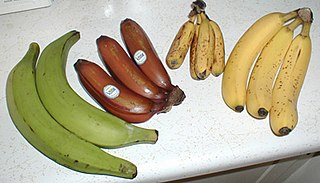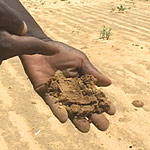Related Research Articles

A banana is an elongated, edible fruit – botanically a berry – produced by several kinds of large herbaceous flowering plants in the genus Musa. In some countries, bananas used for cooking may be called "plantains", distinguishing them from dessert bananas. The fruit is variable in size, color, and firmness, but is usually elongated and curved, with soft flesh rich in starch covered with a rind, which may be green, yellow, red, purple, or brown when ripe. The fruits grow upward in clusters near the top of the plant. Almost all modern edible seedless (parthenocarp) bananas come from two wild species – Musa acuminata and Musa balbisiana. The scientific names of most cultivated bananas are Musa acuminata, Musa balbisiana, and Musa × paradisiaca for the hybrid Musa acuminata × M. balbisiana, depending on their genomic constitution. The old scientific name for this hybrid, Musa sapientum, is no longer used.

The International Institute of Tropical Agriculture (IITA) is a nonprofit organization that works with partners to enhance crop quality and productivity, reduce producer and consumer risks, and generate wealth from agriculture, with the ultimate goals of reducing hunger, malnutrition, and poverty. IITA's research-for-development (R4D) focuses on addressing the development needs of tropical countries. The institute was established in 1967 and headquarters located in Ibadan, Nigeria, with several research stations spread across Africa. The organization is governed by a Board of Trustees, supported by several countries and the Consultative Group on International Agricultural Research (CGIAR).

CGIAR is a global partnership that unites international organizations engaged in research about food security. CGIAR research aims to reduce rural poverty, increase food security, improve human health and nutrition, and sustainable management of natural resources.

The Intergovernmental Group of Twenty-Four on International Monetary Affairs and Development, or The Group of 24 (G-24) was established in 1971 as a chapter of the Group of 77 in order to help coordinate the positions of developing countries on international monetary and development finance issues, as well as and to ensure that their interests are adequately represented in negotiations on international monetary matters. Though originally named after the number of founding Member States, it now has 28 Members. Although the G-24 officially has 28 member countries, any member of the G-77 can join discussions.
The International Food Policy Research Institute (IFPRI) is an international agricultural research center founded in 1975 to improve the understanding of national agricultural and food policies to promote the adoption of innovations in agricultural technology. Additionally, IFPRI was meant to shed more light on the role of agricultural and rural development in the broader development pathway of a country. The mission of IFPRI is to provide research-based policy solutions that sustainably reduce poverty and end hunger and malnutrition.
Florence Muringi Wambugu is a Kenyan plant pathologist and virologist. She is known for her advocacy of using biotechnology to increase food production in Africa.

Bioversity International is a global research-for-development organization that delivers scientific evidence, management practices and policy options to use and safeguard agricultural biodiversity to attain global food- and nutrition security, working with partners in low-income countries in different regions where agricultural biodiversity can contribute to improved nutrition, resilience, productivity and climate change adaptation.
The International Society for Horticultural Science (ISHS) is the world's leading independent organization of horticultural scientists. Its aim is "to promote and encourage research and education in all branches of horticultural science and to facilitate cooperation and knowledge transfer on a global scale through its symposia and congresses, publications and scientific structure." Membership is open to all interested researchers, educators, students and horticultural industry professionals.
Crop diversity or crop biodiversity is the variety and variability of crops, plants used in agriculture, including their genetic and phenotypic characteristics. It is a subset of a specific element of agricultural biodiversity. Over the past 50 years, there has been a major decline in two components of crop diversity; genetic diversity within each crop and the number of species commonly grown.

Musa acuminata is a species of banana native to Southern Asia, its range comprising the Indian Subcontinent and Southeast Asia. Many of the modern edible dessert bananas are from this species, although some are hybrids with Musa balbisiana. First cultivated by humans around 10 kya, it is one of the early examples of domesticated plants.

Saba banana is a triploid hybrid (ABB) banana cultivar originating from the Philippines. It is primarily a cooking banana, though it can also be eaten raw. It is one of the most important banana varieties in Philippine cuisine. It is also sometimes known as the "cardaba banana", though the latter name is more correctly applied to the cardava, a very similar cultivar also classified within the saba subgroup.

Fe'i bananas are cultivated plants in the genus Musa, used mainly for their fruit. Unlike most other cultivated bananas they are diploids of the AA-type. They are very distinct in appearance and origin from the majority of bananas and plantains currently grown. Found mainly in the islands of the Pacific, particularly French Polynesia, Fe'i bananas have skins which are brilliant orange to red in colour with yellow or orange flesh inside. They are usually eaten cooked and have been an important food for Pacific Islanders, moving with them as they migrated across the ocean. Most are high in beta-carotene.

Señorita bananas are diploid cultivars of the banana Musa acuminata originating in the Philippines. They are very small stout bananas which, like all bananas belonging to the AA cultivar group, are known for being extraordinarily sweet.

Matoke, locally also known as matooke, amatooke in Buganda, ekitookye in southwestern Uganda, ekitooke in western Uganda, kamatore in Lugisu, ebitooke in northwestern Tanzania, igitoki in Rwanda, Burundi and by the cultivar name East African Highland banana, is a group of starchy triploid banana cultivars originating from the African Great Lakes. The fruit is harvested green, carefully peeled, and then cooked and often mashed or pounded into a meal. In Uganda and Rwanda, the fruit is steam-cooked, and the mashed meal is considered a national dish in both countries.
Krishna Lal Chadha is an Indian horticultural scientist, author and a former National Professor of the Indian Council of Agricultural Research. He was honored by the Government of India, in 2012, with the fourth highest Indian civilian award of Padma Shri.
The Nordic Genetic Resource Center is a plant, farm animal and forest conservation, gene resource guardian, and sustainable use organization under and primarily financed by the Nordic Council of Ministers, and is headquartered in Alnarp, near Malmö, in southern Sweden. NordGen's primary mission is "securing the broad diversity of genetic resources linked to food and agriculture" through "conservation and sustainable use, solid documentation and information work and international agreements".

AFR100 is an international partnership between African nations, financial interests both donor and business, technical organizations, and local interests which aims to restore more than 100 million hectares of land in Africa by 2030. It aims to have these efforts increase food security, combat poverty, and reduce the impacts of climate change within the continent. It is also part of the global Bonn Challenge to restore 150 million hectares by 2020 and 350 million hectares by 2030. As of Nov 29, 2021 they have commitments of 127.77% of their target from 31 African countries.
Norman Willison Simmonds FRSE FIB FLS was a British botanist. He was a world authority on the cultivation of bananas. He was the first non-American to be awarded the Bronx-based Society for Economic Botany's Distinguished Economic Botanist Award.
MusaNet is a global network of scientists and other stakeholders working on banana genetic resources. Founded in 2011 and coordinated by Bioversity International, it has over 100 individual members representing various banana research institutes and organizations.

Cardava bananas, also spelled cardaba or kardaba, is a triploid hybrid (ABB) banana cultivar originating from the Philippines. It is primarily a cooking banana, though it can also be eaten raw. It is commonly confused with the more ubiquitous and closely related saba banana because they are used identically in traditional Filipino cuisine. Their common names can be interchanged in everyday usage though they are different cultivars.
References
- 1 2 Sharrock, S., Orjeda, G. and Frison, E.A. 1998. ProMusa - a global programme for Musa improvement. p.337-344. In: Galán Saúco, V. (ed.). Proceedings of First International Symposium on Banana in the Subtropics, Puerto de la Cruz, Tenerife, Spain, 1997/11/10-14. Acta Horticulturae 490. ISHS, Leuven, Belgium.
- ↑ "ProMusa".
- ↑ About ProMusa
- ↑ "Past symposia and meetings".
